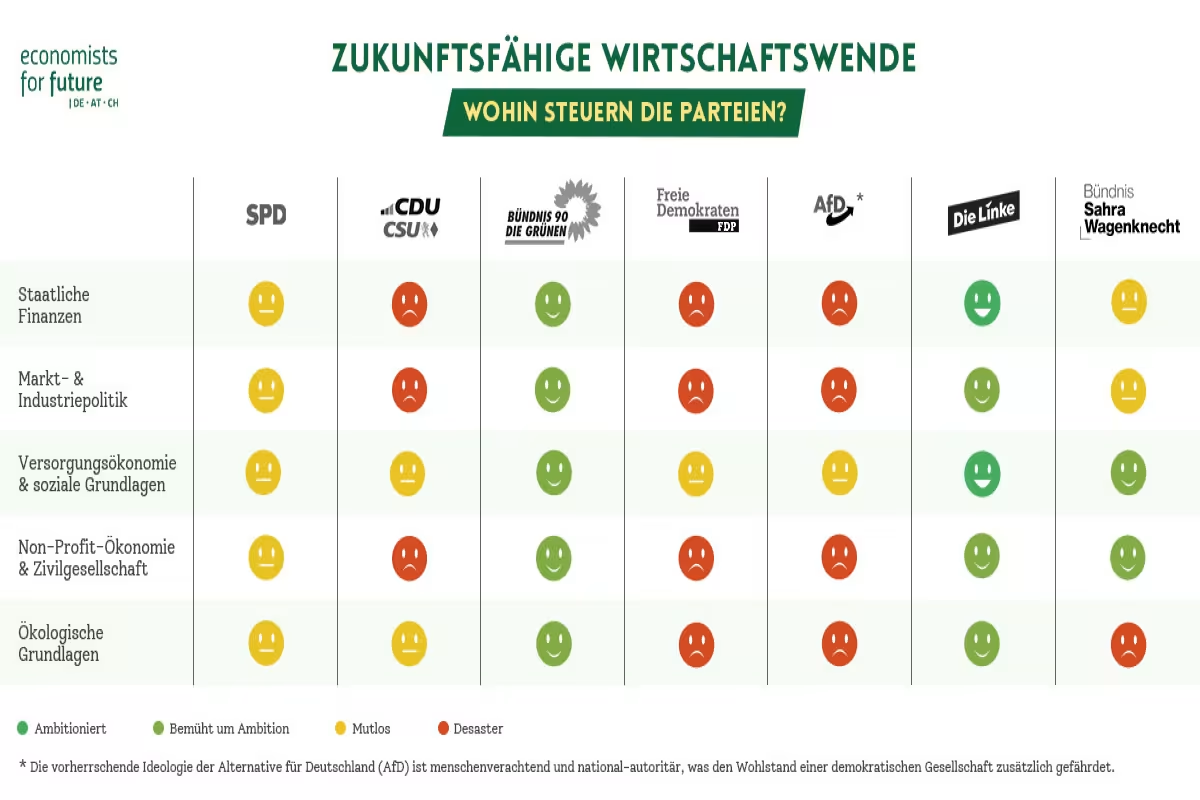
SHERIDAN, WYOMING – Feb. 12, 2025 – The German federal election of 2025 is fast approaching, and with it comes a critical evaluation of the economic policies proposed by the contending parties. Economists for Future, a non-profit association composed of economists, researchers, and practitioners, has meticulously analyzed the economic platforms of the major political parties to provide an in-depth understanding of their stances.
Methodology
Economists for Future employed a robust methodology, drawing on a broad network of experts and a comprehensive database of over 80 articles from their annual econ4future debate series. This analysis identified 93 key economic topics, grouped into five categories:
- State Finances: Including wealth and tax policies, credit-financed government spending, public investment, and the reduction of environmentally harmful subsidies.
- Market and Industrial Policy: Covering competition policy, circular economy, and sustainability orientation.
- Supply Economics and Social Foundations: Addressing unpaid and care work, basic services, and social security.
- Non-Profit Economy and Civil Society: Focusing on the democratization of the economy, social innovation, public welfare orientation, and education and research policy for sustainability.
- Ecological Foundations: Analyzing climate protection, protection of natural commons, and the human-nature relationship.
Each party was assessed within these categories, receiving ratings ranging from "Ambitious" to "Disaster" based on the scientific soundness of their policies, commitment to concrete measures, and overall coherence.
Key Findings
The analysis revealed a stark contrast between the economic visions of the different parties, highlighting a significant divide in their approaches to tackling key challenges.
- State Finances: The Left party presented the most ambitious approach, advocating for increased state financial capacity through wealth tax, the elimination of the debt brake, and a commitment to public investment. CDU/CSU and FDP were classified as "Disaster" due to their proposals for tax cuts and a rigid adherence to the debt brake, potentially undermining the state's capacity to address economic challenges.
- Market and Industry Policy: Again, CDU/CSU and FDP faced criticism for their focus on deregulation and opposition to measures like the supply chain law, potentially hindering sustainability efforts. The Left party and the Greens were more ambitious, supporting regulations for sustainable production and resource consumption.
- Supply Economics and Social Foundations: The Left party stood out with its comprehensive proposals to address care work, basic services, and social security. Other parties received lower ratings due to their lack of focus on these crucial areas, potentially exacerbating social inequalities.
- Non-Profit Economy and Civil Society: A general lack of ambition was observed across parties regarding promoting non-profit and civil society engagement. While some parties expressed support for initiatives like citizen councils and social innovation, concrete measures were limited.
- Ecological Foundations: The Left party and the Greens demonstrated a strong commitment to ecological sustainability, with the Left party advocating for ambitious climate neutrality targets and acknowledging the limits of growth. In contrast, FDP and AfD were classified as "Disaster" due to their denial of climate change or a dismissive stance on achieving climate neutrality.
Conclusion
The Economists for Future analysis offers a valuable roadmap for voters in the 2025 German federal election. It underscores the urgent need for economic policies that prioritize social and ecological well-being, highlighting the disparities between the parties' visions for the future. The analysis serves as a call to action for both political parties and the public to engage in constructive dialogue and champion policies that foster a sustainable and equitable economy.
For more information visit.